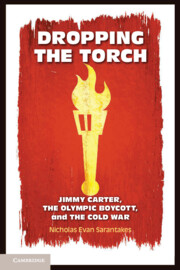Book contents
- Frontmatter
- Contents
- Acknowledgments
- Abbreviations
- Introduction Miracle on Ice
- Chapter 1 Lord Killanin and the Politics of the Olympics
- Chapter 2 Los Angeles versus Moscow
- Chapter 3 Jimmy Carter and U.S.-Soviet Relations
- Chapter 4 The Soviet Invasion of Afghanistan
- Chapter 5 The American Response
- Chapter 6 Easy Victories
- Chapter 7 Painful Losses
- Chapter 8 The White House Games
- Chapter 9 Coca-Cola, NBC, and the Defeat of the Iron Lady
- Chapter 10 The Vote in Colorado
- Chapter 11 Civil Wars
- Chapter 12 Carter versus Killanin
- Chapter 13 Moscow: The Olympics Are the Olympics
- Chapter 14 Los Angeles
- Chapter 15 Conclusion
- Epilogue
- Notes
- Bibliography
- Index
Chapter 6 - Easy Victories
Published online by Cambridge University Press: 05 September 2012
- Frontmatter
- Contents
- Acknowledgments
- Abbreviations
- Introduction Miracle on Ice
- Chapter 1 Lord Killanin and the Politics of the Olympics
- Chapter 2 Los Angeles versus Moscow
- Chapter 3 Jimmy Carter and U.S.-Soviet Relations
- Chapter 4 The Soviet Invasion of Afghanistan
- Chapter 5 The American Response
- Chapter 6 Easy Victories
- Chapter 7 Painful Losses
- Chapter 8 The White House Games
- Chapter 9 Coca-Cola, NBC, and the Defeat of the Iron Lady
- Chapter 10 The Vote in Colorado
- Chapter 11 Civil Wars
- Chapter 12 Carter versus Killanin
- Chapter 13 Moscow: The Olympics Are the Olympics
- Chapter 14 Los Angeles
- Chapter 15 Conclusion
- Epilogue
- Notes
- Bibliography
- Index
Summary
With the decision made, the Carter Administration initiated their efforts to impose its political will on the international Olympic movement. Early endeavors were largely successful. These victories came on the domestic front and made it clear that regardless of the tool used to measure public sentiment, Carter was on solid ground. The American people supported a boycott against Moscow.
The President started the process himself. He took the boycott message to the American people on January 20, appearing on the Sunday morning television talk show Meet the Press. After the appropriate introductions, moderator Bill Monroe of NBC News had the first question and asked if the United States would boycott the Olympics. “Neither I nor the American people would support the sending of an American team to Moscow with Soviet invasion troops in Afghanistan,” Carter replied. “I have sent a message today to the United States Olympic Committee spelling out my own position, that unless the Soviets withdraw their troops within a month from Afghanistan that the Olympic games be moved from Moscow to an alternative site, or multiple sites, or postponed or cancelled.”
That deadline of one month was controversial at the time and ever since. Many domestic critics saw it is as an example of Carter’s generally inept handling of foreign policy; that in setting a date he robbed himself of flexibility, committing himself to action against the Soviet Union sooner than circumstances demanded. An editorial in Sports Illustrated argued that waiting longer “would have been ideal for making the Soviets squirm.”
- Type
- Chapter
- Information
- Dropping the TorchJimmy Carter, the Olympic Boycott, and the Cold War, pp. 95 - 113Publisher: Cambridge University PressPrint publication year: 2010



